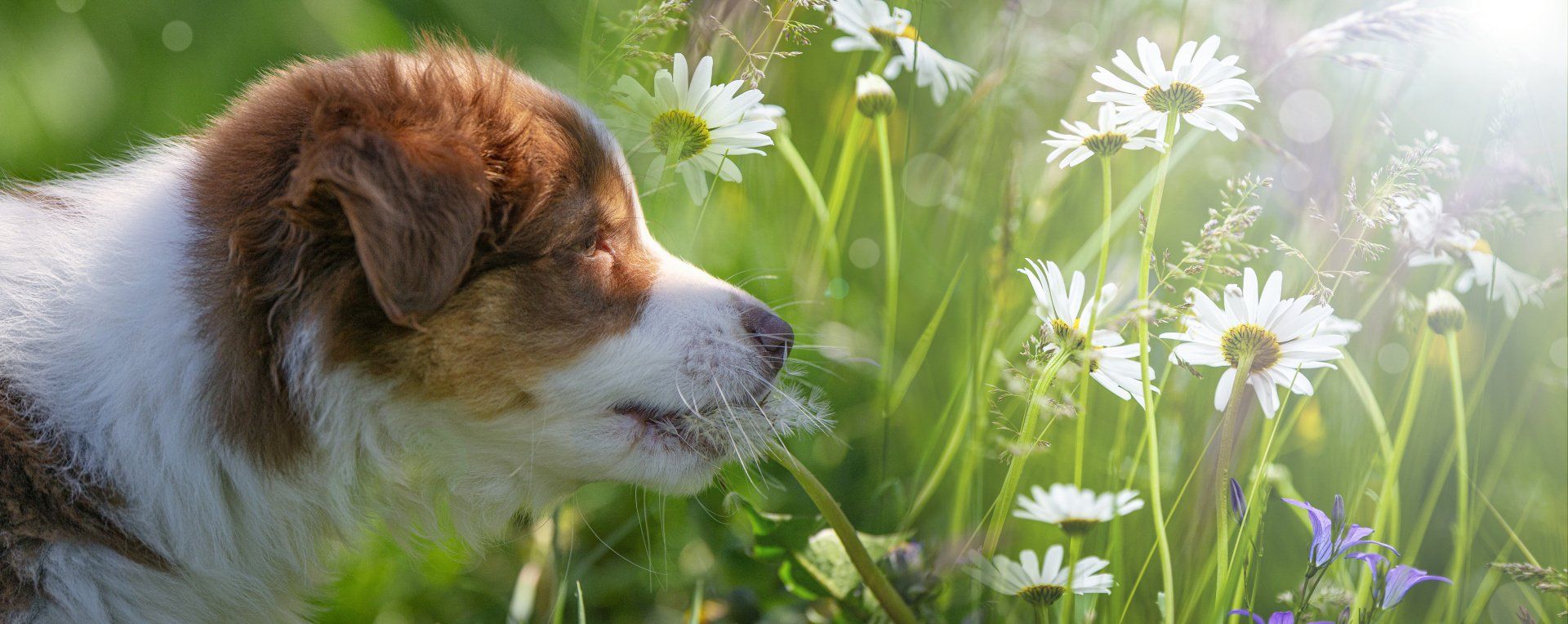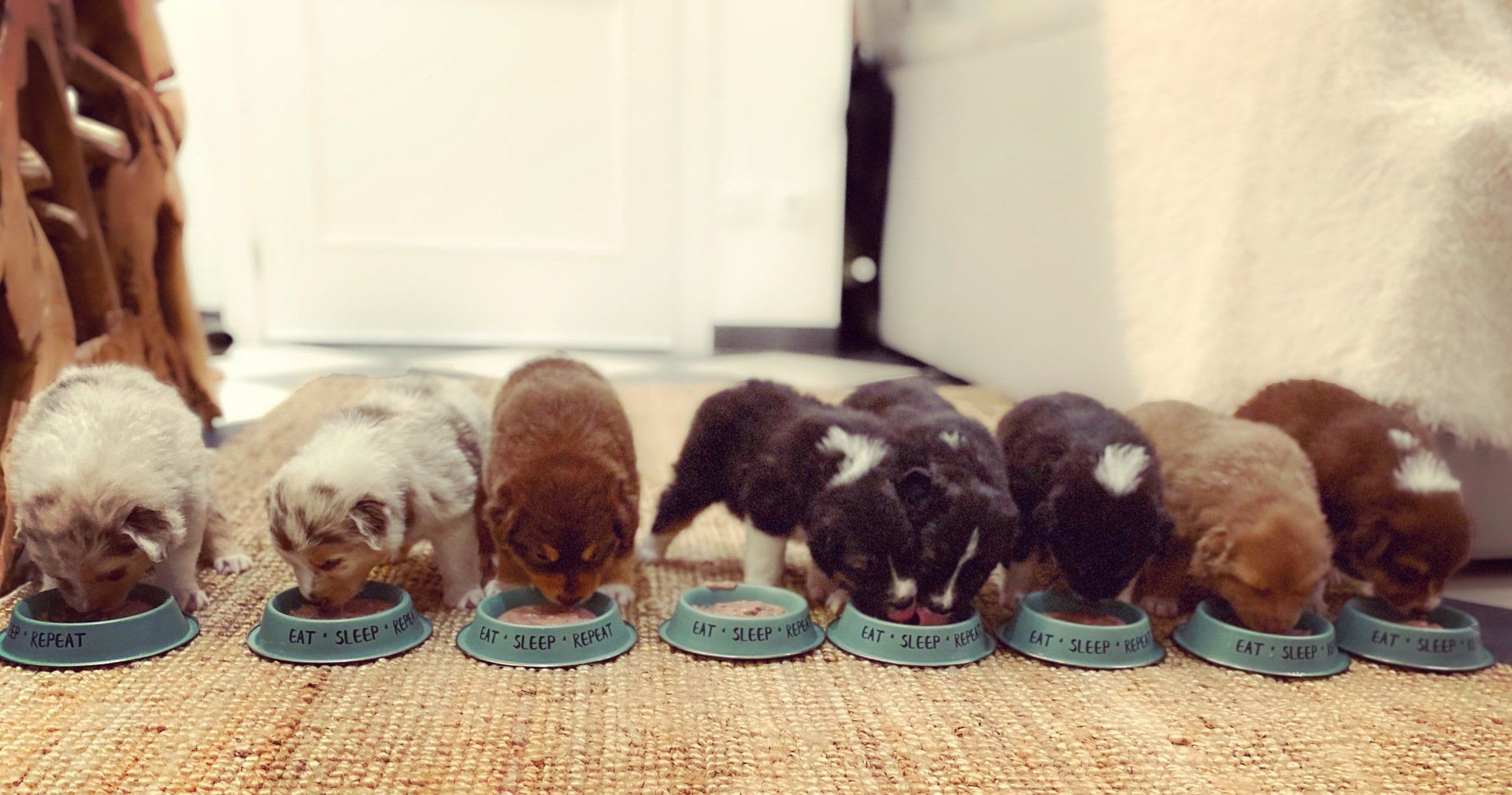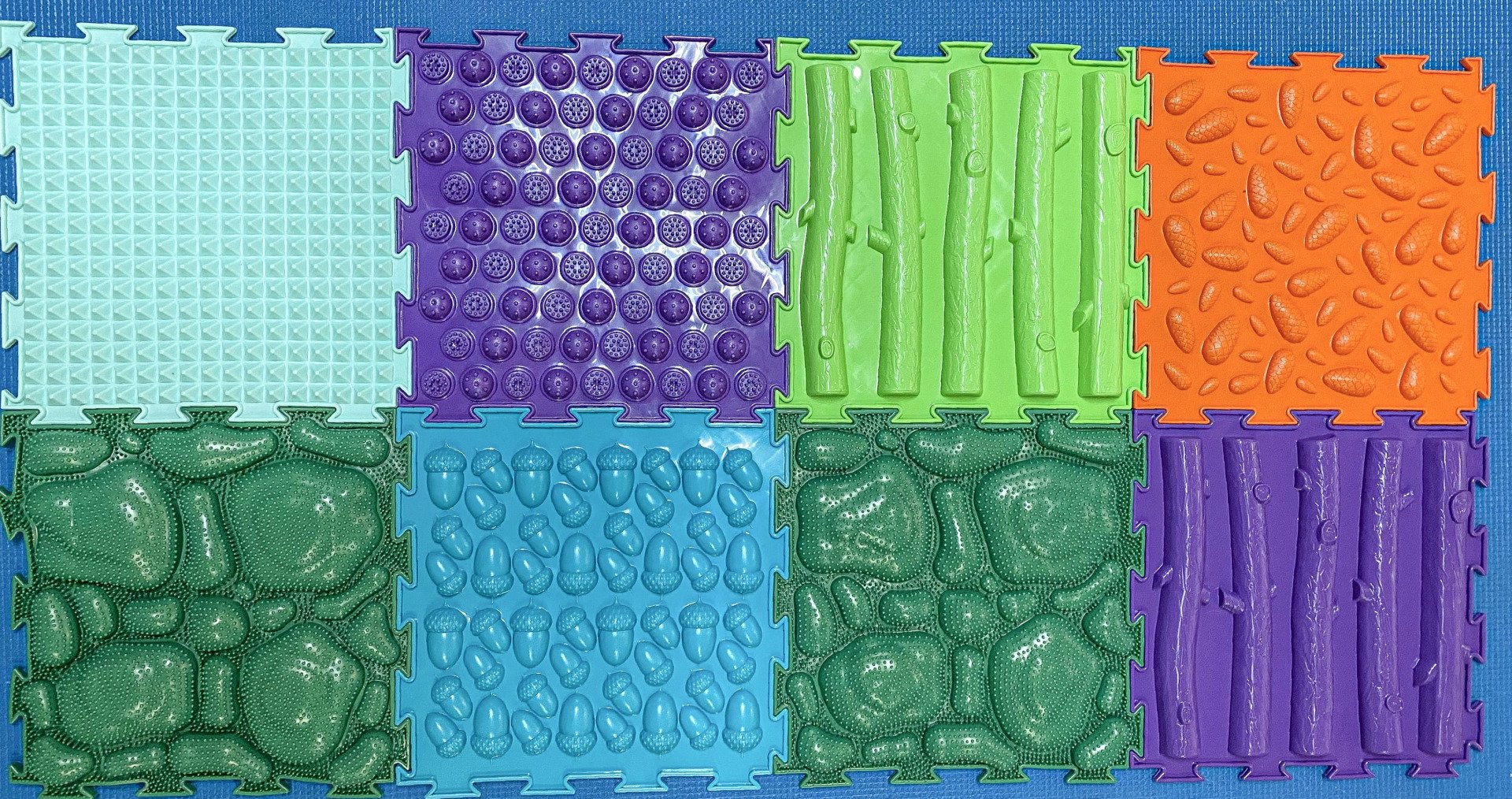A lifelong part of our family
Our puppies are born in our bedroom where they will stay for their first weeks until then moving into their puppy quarters in our living room. Of course, they will also explore our terrace and garden. When they are old enough, they will get to know driving and explore other places and dogs with us.
As a responsible breeder, you already have a wide range of options for preparing your puppies for their future life. This includes age-appropriate stimulation of the puppies, familiarization with a wide variety of noises and things, as well as reinforcement of desired behavior from the start. In this way, our little darlings learn from day one what is worthwhile behavior and what is not.
Well prepared for life
1st - 3rd week
In nature, puppies stay in their cave or in the immediate vicinity. They are in a very relaxed state as their brain is dominated by the parasympathetic nervous system. This is used for recovery and the build-up of the body's own reserves. The body focuses entirely on growth. Right from the start, they already have a sense of touch, smell and taste, though they will keep on developing over the next few months. They are already making their first learning experiences. Slight temperature fluctuations and a feeling of hunger are already the first, very low stressors for them. Reaching the heat source (mom and siblings) and the mums milk bar automatically represents a reward for their efforts. As a breeder, you can already lay the foundations for balanced and adaptive puppies here if you don't put them on the mom's teats straight away, but let them look for them themselves.
From the 3rd day on, we start with the neurological early stimulation program according to Battaglia. Up to the 16th day of life, 5 very short exercises are carried out daily (Bio Sensor program), which is supposed to make the puppies more stress-resistant, more capable of learning and more robust in terms of health. Since we already have intensive contact with our puppies on a daily basis during this time, they combine the human smells and touch with a feeling of security.
Everything that the puppies get to know at this time, they save as something naturally. That is why we attach great importance to the fact that the puppies are part of our normal everyday life from the very beginning. From day one, they get to know the most diverse smells and noises in the household, from vacuum cleaners and household appliances to music and television to the hum of normal human voices. Since we live next to a school, noises from outside are also part of their everyday life, such as cars driving past, car doors slamming, screaming children, etc. Further, we work with a special sound CD developed by experts and recommended by veterinarians which, for example, plays fireworks and thunderstorms. Since our puppies grow up in our living room, they automatically perceive the different brightnesses of the day-night rhythm. In addition, we also present different surfaces to them from time to time, so that even a rustling plastic sheet cannot disturb them.
In this phase, we are already building up the scent of lavender as a conditioned relaxation signal. This all happens completely unconsciously and the puppies do not have to do anything for it. However, it works very effectively and gives our future puppy families a valuable tool to help the puppies move into their new home, establish rest periods or relax while visiting a restaurant.
As a breeder, you can already lay a major foundation for house training. Between the 16th and 21st day the puppies learn to dispose of faeces and urine independently. To do this, they leave their litter camp. This is a very exciting phase as the pups develop an underground preference for doing their businesses. If they always pee on soft materials such as blankets or towels in the breeders house, they will also look for these materials in their new home in order to do their business. This can be a problem for their new family when it comes to house training. We take advantage of this tendency by laying out a piece of artificial gras next to their resting, play and eat area. That makes it a lot easier, because they will prefer to pee on grass than on blankets, tiles or wooden floors of their new family.
4th - 5th week
Now it gets really exciting, because the babies are becoming more and more agile and are starting to leave their litter camp. The most important maturation processes in the brain take place in the first 6 weeks. The autonomic nervous system reacts more strongly to external stimuli by releasing adrenaline. One can also already observe that they recognize familiar stimuli. Now family and friends come to visit us, sometimes with very calm, social dogs. And of course our future puppy owners are also invited to visit us and spend time with the little pups.
Curiosity still outweighs uncertainty. However, they could now and then react with avoidance, flight or fear behavior. Therefore, we pay special attention to the fact that they get to know different stimuli in a positive or at least neutral way every day. We proceed very cautiously, especially with stressors that could trigger anxiety. Sudden stimuli, such as shaking up a blanket, our puppies get to know again and again, but after such a perception they are also rewarded directly with particularly tasty food or happy interactions. We take great care that the puppies stay in their emotional balance or find their way back there immediately. We encourage the puppies without overwhelming them!
In this phase we also start to carry out the first handling measures. During the usual interaction, we sometimes look into their ears and the mouth and check the rest of the body. In our living room there is also a dog box, in which they can always find great treats or toys. This is how the puppies learn that a box represents something great and, in the best case, that something positive happens when they tap into it.
Between the 5th and 8th week the nerve fibers and their connections play a particularly important role, which is why it is important that the dogs get to know interesting and varied environments in this phase. Our puppies spend now more and more time with us outside on the terrace, where they encounter new things every day, such as piles of leaves, a box with balls or wobbly pillows that test their coordination and motor skills. We deliberately spend also time outside when it is already dark, so that there is no reason for them to fear this either.
From the 4th / 5th week onwards, our puppies are fed with very high quality wet food. This is the starting signal for us to begin with other training, namely with exercises for recall. Every time before we reach for the food and give it to the puppy, we whistle. This makes the whistle an announcement for the meal. Little by little we also add small distractions and so we build up a signal in a playful way, which the future puppy parents then only have to develop further. At this time we also start to put a, under physiotherapeutical aspects ideal adapted, harness on our puppies before eating, which we remove again after eating, so this is already conditioned positively. Right from the start, we only work through positive training with our puppies, observing and rewarding desirable behavior, while ignoring undesirable behavior or gently interrupting it. Here, too, they make their first important learning experiences that will help the future owners a lot.
6th - 8th week
From the 6th week a sensitive phase begins in the puppies, in which the autonomic nervous system is increasingly dominated by the sympathetic nervous system (stress). They can now react more insecurely or even fearfully to new stimuli. It is therefore particularly important that they never experience a loss of control in anything they get to know now. We only use new stimuli very carefully and let the puppies decide for themselves whether they want to deal with them and in what intensity. Small motor challenges such as wobbling boards and ball baths promote their self-confidence and play an important role in keeping their joints healthy. The articular cartilage is only nourished under load, i.e. through the absorption of nutrients from the synovial fluid. Diverse and varied movements help lubricate the joint surface. That's why the little ones already get to know a small puppy pool and sand. We also work with special mats from the human physiotherapy area, which have different surfaces and degrees of hardness. They activate the three-dimensional perception through the proprioceptors on the underside of the paws and train muscles and balance.
In this phase, we also take them on small car trips to unknown places and let them explore there. We always present new things and toys and initiate games with them separately so that they become more independent from their siblings. This is also the time when the puppies can be assigned to their respective families. From the experiences of the last few weeks one can already see tendencies in the character and thus decide in which family the respective puppy is best taken care of. If a dog is to be used in sport later, it is a good idea that this dog was not the most fearful in the various activities with us and that it faced new challenges more courageously. Nonetheless, of course, we understand that sometimes there are simply these teams who see each other, fall in love and where all the tendencies that can already be suspected then fade into the background. We will always try to bring these teams together. That's why it's so nice when the future puppy parents come to visit us regularly and can thus form a bond with a very specific puppy. You are also welcome to hand in worn items of clothing that we give to your future puppy from time to time. This makes it easier for them to settle in in their new home.
And at the very end the most difficult step comes for us, namely when we hand over our little, well-protected dog children, raised with a lot of love and wishes, into the hands of their new families. But we are sure that by then the right dream teams have been found and that we have been able to give both the families and the puppies all the important tools to make them a strong unit. Since our little fur babies will always be part of the family, we are very happy when the families keep us up to date and can also provide us with information and photos in the future. Since we only want the best for them in the future, they will be welcome in my dog school under special conditions for the rest of their life.
List of interest
If you are interested in one of our Dreamteam puppies, please contact us and we will add you to our list of interested parties. You will then be kept up to date about the birth and the upbringing of the puppies
Thank you for your interest in one of our dream team puppies. We will keep you up to date on all the news from now on.
Oops, there was an error sending your message. Please try again or just contact us directly.
List of interest
If you are interested in one of our Dreamteam puppies, please contact us and we will add you to our list of interest. You will then be kept up to date about the birth and the upbringing of the puppies.
Thank you for your interest in one of our dream team puppies. We will keep you up to date on all the news from now on.
Oops, there was an error sending your message. Please try again or just contact us directly.





































